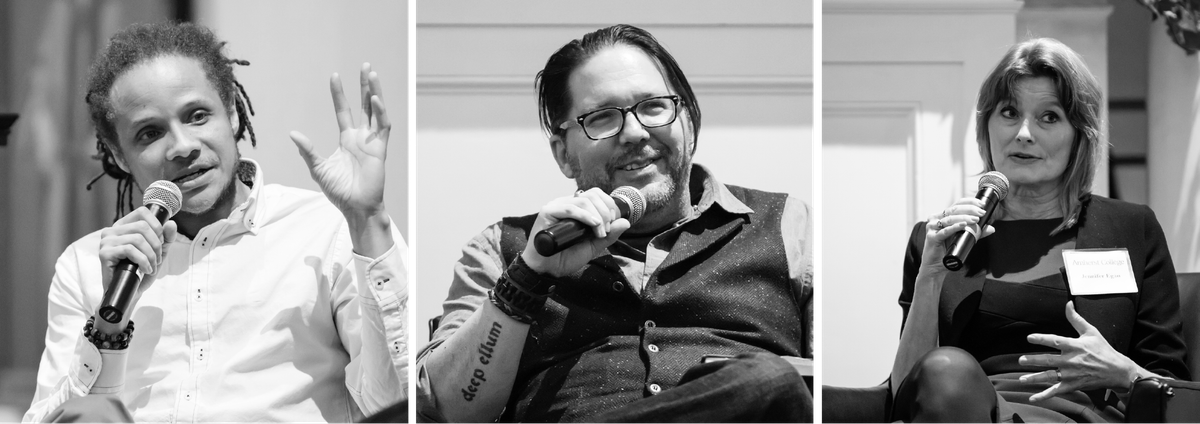Master Classes Let Students to Delve into Creative Writing

Amherst’s fourth annual LitFest featured a variety of master classes — an intimate teaching experience with the festival’s featured writers. The workshops are organized around different themes to introduce students to creative writing techniques in a hands-on setting.
These workshops serve as a strong example of how the Amherst community and LitFest sponsors have worked to strengthen the tie between student experiences and creative writing.
The authors themselves drive the curriculum of the workshops, so each takes on a unique form.
“Sometimes there might be some generative writing exercises, or sometimes it’s much more informal, and it’s really just a question-and-answer session with the author, where the students really have free range,” said Jennifer Acker, editor-in-chief of the literary magazine, The Common, and one of LitFest’s organizers.
In an intimate setting, the organizers give 15 to 20 students the opportunity to learn about techniques acclaimed writers use in their own books. This year, author Brandon Hobson taught his class “Urgency in Literature,” Jennifer Egan used her class to present on her strategies for researching historical fiction and Jamel Brinkley taught on the role of narrators and ego in fiction.
In 2018, Min Jin Lee, one of three authors leading a class, ran with this open structure and hosted a master class featuring the art and craft of interviewing — an essential part of her own process for writing her award-winning novel “Pachinko.”
In her class, she spoke about the process of interviewing people to learn about their experiences and how you incorporate those experiences into fiction.
In his class, Hobson, author of “Where the Dead Sit Talking,” had students practice exercises that emphasized the role of urgency in fiction writing. After discussing successful examples of urgency in a number of texts, Hobson gave the students a passage from the book “Libra” by Don Delillo and asked them to underline important words to compile a word bank.
From there, students were tasked with writing their own version of the passage with the same words. The point of this exercise was to help students focus on using only important words within a limited space and develop techniques for bringing this strategy into the student’s own writing.
Brinkley, who wrote “A Lucky Man,” used his masterclass to teach on his ideas of the role of ego in first-person narration and the importance of still making room for other characters in a story.
“Your responsibility is to tell the whole story. You can’t let the story take on the limitations of your narrator,” he said, according to Julia Pike ’19 who was in attendance.
Egan, Pulitzer Prize-winning author of “A Visit from the Goon Squad” and “Manhattan Beach”, took her class in a different direction and presented on her own journey of research in the Brooklyn Navy Yard and Brooklyn Historical Society archives which led her to write “Manhattan Beach.”
She also discussed her daily routine of loose writing, during which she enters what she describes as a “meditative state” that allows her to tap into the thoughts of her unconscious.
“What I got out of that was the need for routine in an artistic practice. I think she called it self-indoctrination, even comparing [the daily commitment] to a relationship with exercise. I think this semester I’m trying to do that with my painting class, making it a routine to go into the studio,” said Lisa Zheutlin ’21 who participated in the class.
“I was also really interested in her comment of fiction being the only time we know exactly how someone perceives reality, as we create that reality for them,” Zheutlin added.
The program is part of an effort by LitFest to give students another outlet for creative writing: “The real goal is to put students in contact with these writers, and it gives them a window into the creative process of these writers who are really talented and quite invested in their craft,” said Acker.
“Just that contact and getting students in the same room with a writer so that they can talk about writing, have an opportunity to learn something about how these authors write their own books and how they approach their work [is the goal],” she said.
These LitFest master classes are just another addition to the rich pool of creative writing resources the Amherst community has to offer students. The Amherst Creative Writing Center collaborates with the English department to offer a variety of courses from Fiction Writing and Protest in Poetry to Writing the Novella.
The Amherst campus is home to Circus, a student-run literature and arts magazine that “curates the rich artistic and literary creations of the students of Amherst College,” as their student group page describes.
The college also has a uniquely close connection with The Common, which dedicates an extended effort into educating interns and mentoring young writers.
The Common itself has been an outlet for students’ creative writing and literary pursuit since it was founded in 2011. “From the beginning, Amherst students have been doing real, integral work on the magazine, everything from reading and evaluating submissions to developing and executing events,” said Acker.
“Involving students in the editorial and literary world has been something that I have been interested in and have been actively developing at The Common for the past 10 years,” she said.
Amherst’s historic emphasis on literary excellence has continued into the present day, with 10 percent of the student body majoring in English. LitFest is another example of the school’s continued effort to expand opportunities for creative outlets and to carry the school’s literary tradition into the third century.





Comments ()